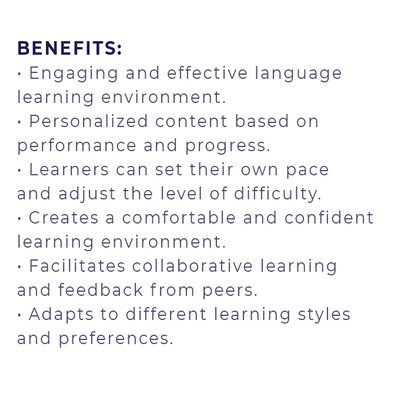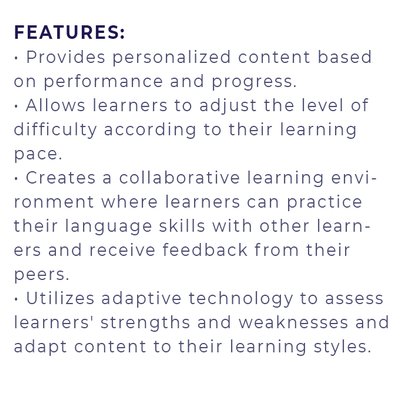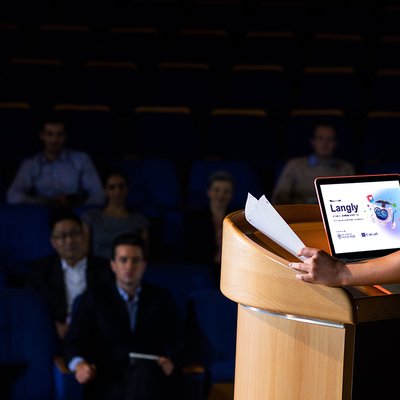Collaboration, continuous learning, and adaptability are the pillars of adaptive learning technology, and they are key to unlocking the full potential of language acquisition.
Collaboration in Adaptive Learning Technology
Collaboration is a vital aspect of adaptive learning technology in language acquisition. Collaborative learning environments facilitate learning from peers, and this can significantly enhance the language acquisition process.
In collaborative language learning environments, learners can practice conversation, auditory, reading, and written expression skills with other learners, and receive feedback from their peers. This approach to language learning is more effective and engaging than traditional language learning methods, and it encourages learners to interact with each other and develop their language skills in a natural way.
In adaptive language learning technology, it is essential to have a commitment to continuous learning and flexibility. Language learning is a continuous process, and it requires consistent practice to acquire and retain language skills. Adaptive learning technology allows learners to engage in continuous learning by providing personalized content based on their performance and progress. This approach to language learning ensures that learners are constantly challenged, which leads to faster and more effective learning.
Adaptability is also essential in online learning, as it allows learners to adjust to different learning styles and preferences. Adaptive learning technology can assess learners' strengths and weaknesses and adapt content to their learning styles. This personalization of content ensures that learners receive content that is relevant to their needs, and it helps them to overcome learning barriers. For instance, if a learner is struggling with reading comprehension, the adaptive technology can provide more reading exercises to improve the learner's skills.

Adaptive learning technology is changing the way people learn languages.
Collaboration, continuous learning, and adaptability are key components of adaptive learning technology in language learning. With this technology, learners can engage in collaborative learning environments, engage in continuous learning, and adapt to different learning styles and preferences. These benefits create an engaging and effective language learning environment that helps learners to acquire language skills faster and more efficiently. Adaptive learning technology is a game-changer in language learning and has the potential to transform the way we acquire new skills in other fields as well.
Langly Inc's Adaptive Learning Technology
Langly Inc is an edtech startup that is currently developing an English learning game. The game is designed to help users practice their English reading, listening, and writing skills in a fun and engaging way. The game utilizes adaptive learning technology to provide personalized content based on the user's performance and progress. This personalization ensures that learners receive content that is relevant to their needs and helps them to overcome learning barriers.
By leveraging adaptive learning technology, Langly Inc's English learning mobile game offers learners an engaging and effective way to acquire English skills. The technology creates a personalized and flexible learning environment that adapts to the learner's needs and provides constant challenges. This approach to language learning is more effective and engaging than traditional language learning methods, and it encourages learners to interact with each other and develop their language skills in a natural way.
What is “Adaptive learning algorithms”?
Adaptive learning AI systems have the potential to tailor the learning process for individual learners in the education and training field. This can be achieved by adapting the content and delivery methods to align with their unique learning styles and abilities, resulting in a personalized learning experience. These algorithms use data about the learner's performance and behavior to make decisions about what content to present and how to present it. The goal of adaptive learning algorithms is to provide a more personalized and effective learning experience by tailoring the content and delivery to the specific needs of each learner.
Adaptive learning algorithms are used in a variety of contexts, including education, training, and e-learning. They are particularly useful in situations where there are large numbers of learners with diverse learning needs, as they allow for more efficient and effective use of resources. Examples of adaptive learning algorithms include recommendation systems, personalized learning paths, and intelligent tutoring systems.

What is “Adaptive learning in artificial intelligence”?
Adaptive learning in artificial intelligence refers to the ability of an AI system to adapt and improve its performance based on its past experiences and interactions with the environment. This type of learning is sometimes also referred to as machine learning or deep learning.
Adaptive learning algorithms use statistical techniques to analyze and learn from data, identify patterns, and make predictions or decisions based on that analysis. As the system processes more data, it can adjust its models and algorithms to improve its accuracy and performance.
In the context of education and training, adaptive learning AI systems can be used to create personalized learning experiences for individual learners, adjusting the content and delivery methods to match their specific learning styles and abilities. This approach can improve learning outcomes, reduce the time and cost of training, and enhance engagement and motivation for learners.
Adaptive learning is considered the future of education because it has the potential to significantly improve the learning experience for students. Here are some reasons why adaptive learning is the future:
- Personalized Learning: Adaptive learning allows students to receive personalized instruction tailored to their individual needs and learning styles. This personalization improves learning outcomes by providing students with the right amount of challenge and support.
- Improved Engagement: Adaptive learning systems are designed to be engaging and interactive, which helps to keep students motivated and focused on learning. By providing immediate feedback and opportunities for practice, students are more likely to stay engaged and learn more effectively.
- Efficient Use of Time: Adaptive learning algorithms can quickly assess a student's knowledge and skill level, and then provide targeted instruction and practice activities. This efficient use of time means that students can learn at their own pace and in their own time, without wasting time on content they already understand.
- Scalability: Adaptive learning systems are highly scalable, which means that they can be used by large numbers of students simultaneously. This scalability makes adaptive learning a cost-effective solution for educational institutions looking to improve learning outcomes while reducing costs.
- Continuous Improvement: Adaptive learning algorithms can collect and analyze data on student performance, allowing instructors to continuously improve their teaching and adjust their instructional approach. This data-driven approach to education is a powerful tool for improving learning outcomes and student success.
Adaptive learning is the future of education because it has the potential to improve learning outcomes, increase engagement, make better use of time, scale to meet demand, and continuously improve teaching methods.












